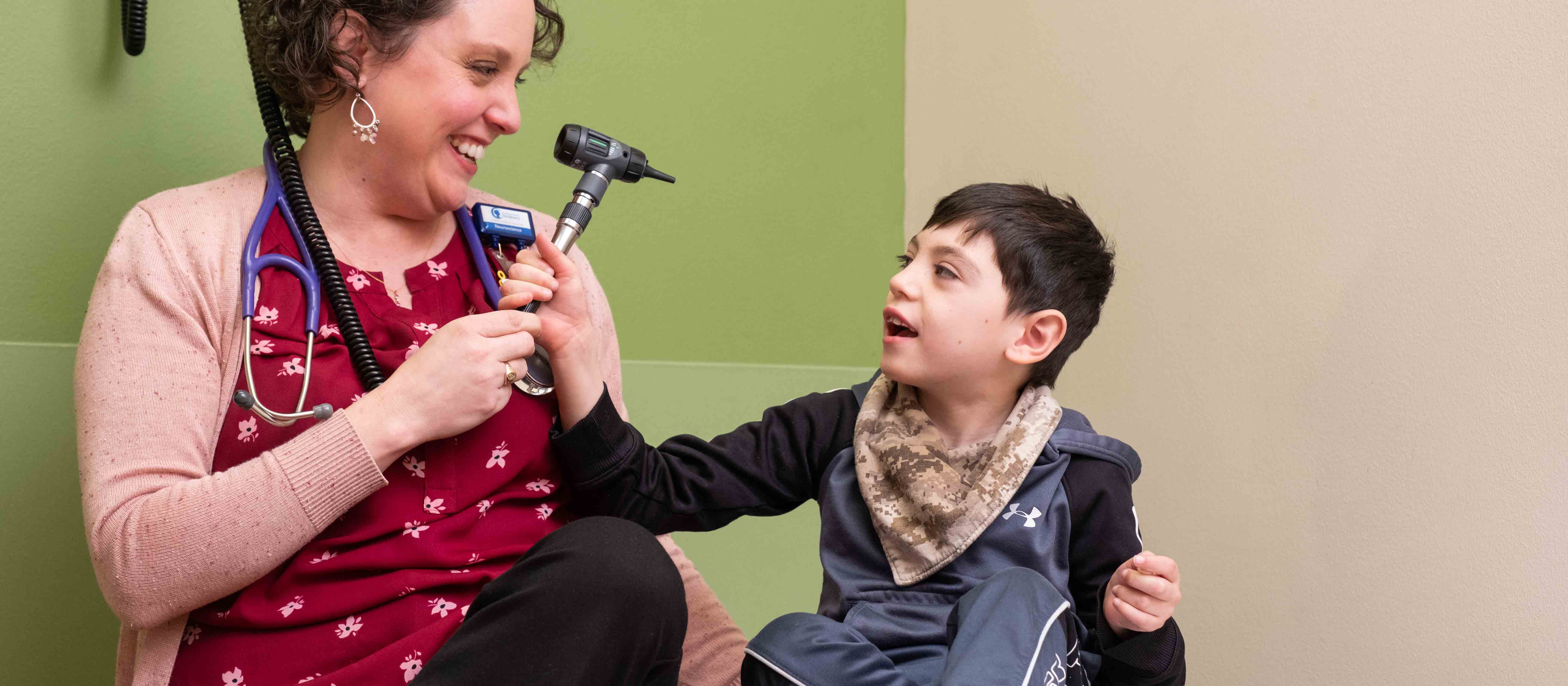Protect your family from respiratory illnesses. Schedule your immunization here >

Ranked nationally in pediatric care.
Arkansas Children's provides right-sized care for your child. U.S. News & World Report has ranked Arkansas Children's in seven specialties for 2025-2026.

It's easier than ever to sign up for MyChart.
Sign up online to quickly and easily manage your child's medical information and connect with us whenever you need.

We're focused on improving child health through exceptional patient care, groundbreaking research, continuing education, and outreach and prevention.

When it comes to your child, every emergency is a big deal.
Our ERs are staffed 24/7 with doctors, nurses and staff who know kids best – all trained to deliver right-sized care for your child in a safe environment.

Arkansas Children's provides right-sized care for your child. U.S. News & World Report has ranked Arkansas Children's in seven specialties for 2025-2026.

Looking for resources for your family?
Find health tips, patient stories, and news you can use to champion children.

Support from the comfort of your home.
Our flu resources and education information help parents and families provide effective care at home.

Children are at the center of everything we do.
We are dedicated to caring for children, allowing us to uniquely shape the landscape of pediatric care in Arkansas.

Transforming discovery to care.
Our researchers are driven by their limitless curiosity to discover new and better ways to make these children better today and healthier tomorrow.

We're focused on improving child health through exceptional patient care, groundbreaking research, continuing education, and outreach and prevention.

Then we're looking for you! Work at a place where you can change lives...including your own.

When you give to Arkansas Children's, you help deliver on our promise of a better today and a healthier tomorrow for the children of Arkansas and beyond

Become a volunteer at Arkansas Children's.
The gift of time is one of the most precious gifts you can give. You can make a difference in the life of a sick child.

Join our Grassroots Organization
Support and participate in this advocacy effort on behalf of Arkansas’ youth and our organization.

Learn How We Transform Discovery to Care
Scientific discoveries lead us to new and better ways to care for children.

Learn How We Transform Discovery to Care
Scientific discoveries lead us to new and better ways to care for children.

Learn How We Transform Discovery to Care
Scientific discoveries lead us to new and better ways to care for children.

Learn How We Transform Discovery to Care
Scientific discoveries lead us to new and better ways to care for children.

Learn How We Transform Discovery to Care
Scientific discoveries lead us to new and better ways to care for children.

Learn How We Transform Discovery to Care
Scientific discoveries lead us to new and better ways to care for children.

When you give to Arkansas Children’s, you help deliver on our promise of a better today and a healthier tomorrow for the children of Arkansas and beyond.

Your volunteer efforts are very important to Arkansas Children's. Consider additional ways to help our patients and families.

Join one of our volunteer groups.
There are many ways to get involved to champion children statewide.

Make a positive impact on children through philanthropy.
The generosity of our supporters allows Arkansas Children's to deliver on our promise of making children better today and a healthier tomorrow.

Read and watch heart-warming, inspirational stories from the patients of Arkansas Children’s.

Hello.

Arkansas Children's Hospital
General Information 501-364-1100
Arkansas Children's Northwest
General Information 479-725-6800

Epilepsy Surgery
At Arkansas Children’s, our board-certified and fellowship-trained neurosurgeons and neurologists work together for the surgical treatment of epilepsy in children. In many cases, surgical intervention can stop seizures completely.
Fast Facts about Epilepsy Surgery
Epilepsy surgery has never been safer and is a great option for children who have tried medications and still have no relief from seizures.
- Between 30-40% of people with epilepsy continue to have seizures while on medications. Surgery is often an option for those people who have uncontrolled seizures while on medications.
- Patients are evaluated for surgical options based on the type of seizure, medications tried, frequency of seizures and location of seizures in the brain.
- We use state-of-the art imaging, such as MEG and TMS, to pinpoint areas affected in the brain and deliver the safest and best outcomes for our patients.
- For up to 80% of people, epilepsy surgery might give them complete freedom from seizures, greatly improving quality of life.

Arkansas Children’s Comprehensive Pediatric Epilepsy Program is the only program in the state with a National Association of Epilepsy Centers (NAEC) Level 4 accreditation, providing the most advanced care for children with epilepsy. Our board-certified doctors are trained to evaluate, diagnose and create an individualized plan for your child.
The thought of surgery for your child can be scary, but this is a decision based on input by the patient, parents, and different evaluations and testing that can take place over weeks to months. Our team uses state-of-the-art imaging and testing to understand exactly the area of the brain where seizures begin to help determine what type of procedure is best for your child.
Some of these tests, such as the electroencephalogram (EEG) can be done in our clinic – often the same day as your appointment.
There are three types of epilepsy surgery. Each type of procedure has a different purpose. The type of surgery will depend on your child’s needs.
-
Treatments
Palliative Epilepsy Surgery
Palliative epilepsy surgery may lower the number and severity of seizures.
-
Treatments
ROSA ONE Brain (Robotic Stereotactic Assistance)
Learn how neurosurgeons at Arkansas Children's may use ROSA One Brain technology to provide our patients with the safest possible experience and positive outcomes.
-
Treatments
Therapeutic Epilepsy Surgery
Therapeutic epilepsy surgery is used to improve or cure seizures. Learn about this procedure at Arkansas Children's.
-
Treatments
Diagnostic Epilepsy Surgery
Diagnostic epilepsy surgery is used to find areas in the brain where the seizures come from.
When might epilepsy surgery be an option for my child?
Surgery may be an option for your child if they have drug-resistant intractable seizures. These seizures are not stopped with medicine. They might be able to have epilepsy surgery if they have taken two medicines for seizures and the medications did not help. But, surgery is not for everyone. To learn whether surgery is right for your child they will likely need several tests.
What are the risk and benefits of epilepsy surgery?
Doctors have been doing epilepsy surgery for more than 100 years. It is not an experimental or last-resort treatment. The risks depend on the type of epilepsy surgery. Risks of epilepsy surgery are often short term and include:
- Memory problems
- Partial loss of sight
- Weakness
- Depression or other mood problems
Benefits from epilepsy surgery
- No more seizures
- Fewer disabling (bad) seizures
- Better quality of life
What should families expect?
Every child’s experience and needs are different. Our neurosurgeons will guide you through planning for surgery, what tests to expect, risks, benefits, and what to expect after surgery depending on what surgical procedure is best for your child. For more information about epilepsy surgery, visit the Epilepsy Foundation’s website for general information and commonly asked questions. Please make a list of questions and bring with you to your child’s appointment so our team can address any questions and concerns.
Meet the Team
-

-

-

-

Raghu Ramakrishnaiah, MD
Radiology
Little Rock, Springdale -

-

Locations
-

-

Arkansas Children's Northwest
2601 Gene George Blvd.
Springdale, AR 72762
479-725-6800
View Location -

ACH Jonesboro Clinic
ACH Jonesboro Clinic
520 Carson Street
Jonesboro, AR 72401
870-336-2175
View Location
Related Services
-
Epilepsy Program
Learn more about how our specialized pediatric epilepsy care can change the short and long-term quality of life for patients who suffer from seizures.

Arkansas Children's MyChart
Manage your child's medical information and connect with your Arkansas Children's medical team anytime online!
Log in to MyChart-
Hospital Services
Hospital Resources
Bookmark Hospital ResourcesAccess the information and tools you need to stay connected with Arkansas Children's quickly.
-
Hospital Services
Interpreter Services
Bookmark Interpreter ServicesArkansas Children's offers translation assistance to the hearing impaired as well as non-English speaking patients and families.
-
Hospital Services
Refer a Patient
Bookmark Refer a PatientArkansas Children's offers comprehensive care to patients through a physician referral.

